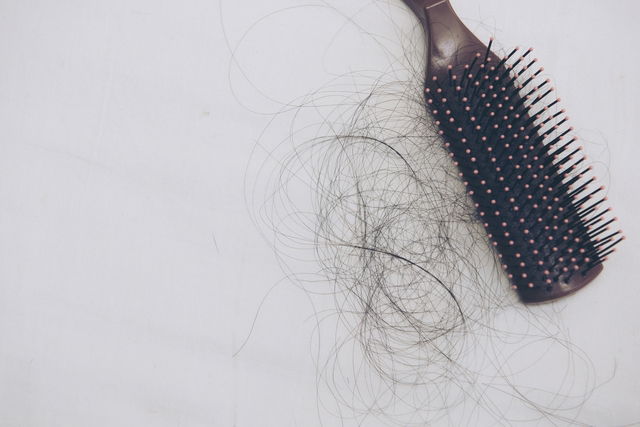Hair loss is usually not a sign for concern and can be a completely natural occurrence. The average person loses 60 to 100 strands per day, especially during colder seasons of the year. During these times, hair loss is more common because the the hair root is receives less blood circulation and nutrients. Typically, people experience less hair loss during warmer seasons.
People who frequently use hair products or equipment or frequently style their hair may also experience more significant hair loss.
Hair loss following a health treatment, like chemotherapy, is relatively normal and usually advised by the doctor before starting. This is an expected finding and not concerning.

Common causes
The most common causes of hair loss are:
1. Excess stress
One of the most common causes of hair loss is excess stress, either physical or mental. The shock of stress (like after a car accident or after receiving a shocking diagnosis) can alter the hair cycle, and lead to fallout.
In other cases, stress may not be the underlying cause of hair loss, but it can worsen it if the hair loss was already happening.
Also recommended: Stress vs. Anxiety: Difference Between Symptoms & Consequences tuasaude.com/en/stress-vs-anxietyWhat to do: You are advised to reduce your stress load my participating in pleasurable activities. This will not only treat the hair loss, but improve your overall quality of life and prevent other problems that are triggered by stress, like IBS or depression. Check out the herbs for stress and anxiety that you can use to make soothing teas at home.
2. Excess vitamin A or B
Although it is relatively rare, excess vitamin A or B-complex vitamins in the body can cause hair loss. This is more frequent in people who are taking supplements for prolonged amounts of time.
What to do: You should use supplements only as directed by a doctor to prevent reaching high doses. If you suspect you may have overdosed on supplements, consult your doctor for assessment.
3. Pregnancy
Hair loss is relatively common in postpartum women, not only due to hormonal changes that continue after labor, but because of the stress of delivery. Generally, the hair loss occurs in the first 3 months postpartum, and can last for an additional 2 months.
Although it is rare, hair loss can also occur during pregnancy. It is related to an increased amount of progesterone, which can dry the hair and make it weaker.
What to do: Ideally, you should avoid stressing out about hair loss, as it is a natural process and will improve with time.
4. Hormonal changes
Just like during or after pregnancy, hormonal change are a significant cause of hair loss which can occur at any phase of life, particularly adolescence. Women who swap their birth control and start a new method may also notice temporary hair loss.
What to do: If your hair loss is very intense, you should consult a dermatologist. If it is related to your birth control, speak to your gynecologist to discuss an alternative birth control option.
5. Antidepressant or medication use
Some classes of medications, like antidepressants, anticoagulants or high blood pressure medication may have hair loss as a side effect. Hair loss can particularly be noted at the start of treatment, or for chronic treatment. Other medications with this effect include methotrexate, lithium and ibuprofen.
What to do: If you suspect hair loss is related to medication use, you should advise your prescriber to discuss the possibility of an alternative medication.
6. Anemia
In addition to excess fatigue and pallor, anemia can also cause hair loss. With anemia, hair strands receive less blood, nutrients and oxygen, making them weaker and prone to breaking. Generally, anemia is caused by a lack of iron, but it may also be related to other factors, such as a lack of B12.
Read more about other symptoms of anemia that can occur in addition to the hair loss.
What to do: In most cases, anemia is related to an iron deficiency, and the first step of treatment is to start iron supplementation. The doctor may also recommended a high-iron diet with plenty of red meat, mussels, parsley and white beans. Learn more about the foods for anemia that you can incorporate into your diet to treat low iron levels and potentially hair loss.
7. Hyperthyroidism
Hyperthyroidism emerges when the thyroid is not functioning correctly. leading to a reduced production of many important hormones. Many of these hormones are needed for metabolism and the growth of new hair strands, and a reduced level may cause hair loss. Check out our online symptoms quiz if you suspect your may have a thyroid problem.
What to do: If you suspect you may have a thyroid disorder, you should consult an endocrinologist for assessment and treatment, which usually consists of iodine supplementation.
8. Androgenetic alopecia
Androgenetic alopecia is hair loss that is caused by a genetic predisposition. It can occur in both men and women.
Generally, in men, hair loss starts at the temples and the hair becomes thinner on the top of the head. In women, thinner hair may be noticed on the top of the head.
What to do: You should consult a dermatologist who can recommend the most appropriate treatment. The doctor may recommend medications applied to the scalp or a hair transplant.
Also recommended: Biotin for Hair Growth: Benefits & How to Take tuasaude.com/en/biotin-for-hair-growth9. Scalp inflammation
Some infections on the scalp, like ringworm or folliculitis, can lead to swelling and hair loss.
In addition to hair loss, these conditions can cause other symptoms such as an itchy scalp, flaking skin or red bumps or pimples on the hairline.
What to do: You should consult a dermatologist so that the scalp inflammation can be diagnosed and treated appropriately. These conditions can be treated with antifungal medicines, antibiotics or corticosteroids.
10. Hair psoriasis
Hair psoriasis is a chronic autoimmune disease in which skin cells multiply very quickly. It causes the appearance of red plaques on the scalp that are silvery-white and well-defined. This condition can affect the entire scalp or just some parts.
Hair psoriasis can lead to hair loss at the sites of the plaques, which is usually temporary.
What to do: you should undergo treatment as prescribed by your dermatologist. He or she may prescribe shampoos, creams or ointments containing corticosteroids or salicylic acid, cyclosporine or methotrexate tablets, or phototherapy.
Also recommended: Psoriasis Diet Plan: What to Eat & Avoid (w/ 3-Day Meal Plan) tuasaude.com/en/psoriasis-diet11. COVID-19
Hair loss may also be related to COVID-19. In these cases, hair loss is noted at the front of the head and occurs when running your hand through your hair or brushing your hair. It can occur weeks to months after the initial infection, and can last over up to 9 months in some cases.
Hair loss related to COVID-19 is known as telogen effluvium and appears to be related to an accumulation of inflammatory substances in the body. It leads to changes in the hair cycle. In addition, it is also believed that the hair loss is related to the stress, anxiety and high-grade fever that are common with cases of COVID-19.
What to do: Telogen effluvium is a limited condition that tends to resolve within a few months without any specific treatment. You may note shorter hair strands in areas where hair loss has occurred, which is a sign that normal hair cycle functioning has been maintained.
However, very significant hair loss in patches should be assessed by a dermatologist. The doctor will evaluate the scalp and order testing to determine the underlying cause. There are some measures that the doctor can use to speed-up growth or delay hair loss.

How to treat hair loss
To treat hair loss, you can use specific products, medications, or supplements like:
- Scalp lotion with minoxidil 5%: This is applied to the scalp twice a day and helps to revitalize the scalp. This lotion increases blood flow and strengthens longer hair strands to prevent breakage.
- Hair loss shampoos and lotions
- Nutritional supplements for hair loss, which contain nutrients that are necessary for the growth and health of hair strands.
- Hair loss medications, like finasteride or propecia, are prescribed by a dermatologist. The doctor can also consider corticosteroids for the hair roots.
It also important to maintain a diet with plenty of essential nutrients, as hair loss can occur with restrictive, low-calorie and low protein diets.
Also recommended: 11 Foods to Help Hair Growth & Why They Work (w/ Recipes) tuasaude.com/en/foods-for-hair-growthMedical treatment
Some treatments that the dermatologist can prescribe for hair loss include:
- Low-dose laser, which is applied once per week for at least 10 weeks. Lasers can stimulate the area of the head affected and prevent healthy hair from falling out.
- Carboxytherapy, which increases blood flow to the scalp and facilitates the penetration of chemical substances into the scalp.
- Hair implants is a surgical technique in which hair strands are implanted directly to the scalp. After about 6 months, the strands can fall out. This technique can cause scalp injuries.
- Hair transplant is a surgery in which a strip of hair is removed from the back of the head and implanted in the front, close to the forehead, or where ever necessary. This an option for people experiencing balding.
Treatment should be advised by a dermatologist after thorough evaluation of the hair loss.
